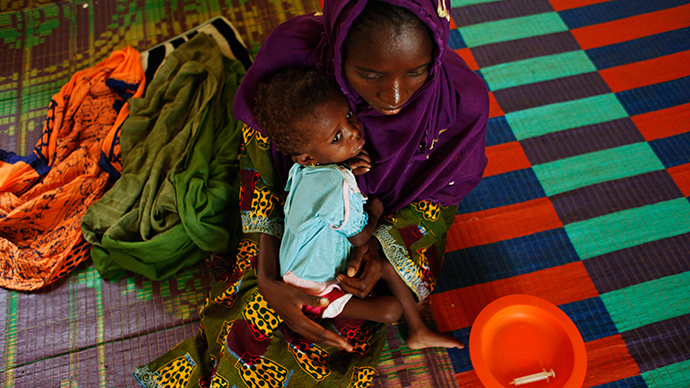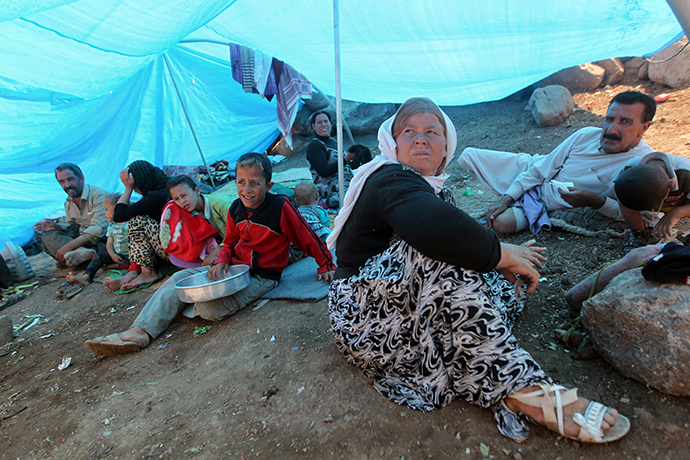World hunger: No reason for celebration yet, data masks real struggle – UN

While the number of hungry people across the globe has seen a sharp fall over the past decade, one in nine people throughout the world – 805 million – still do not have enough to eat, says a joint report by three UN food and agriculture agencies.
The number of chronically undernourished people dropped by more
than 100 million – equivalent to a country the size of the
Philippines – according to a report by the United Nations food
agency (FAO), the International Fund for Agricultural Development
(IFAD), and the World Food Programme (WFP).
However, some success stories – such as in Brazil – mask real
struggles in countries like Haiti, where large concentrations of
undernourished people still remain, the report’s authors pointed
out.
“We cannot celebrate yet because we must reach 805 million
people without enough food for a healthy and productive
life,” WFP executive director Ertharin Cousin said.
Twenty-five developing countries have already met the ambitious
goal of halving the absolute number of chronically undernourished
people between 1990 and 2015. But there is not enough time for
the rest of the world to achieve the same rates by 2015, the
report states.

The continent with the highest rate of undernourishment is
Africa, where one in five people have too little access to
nutritious food. In the Central African Republic – where 38
percent of the population is undernourished – an ongoing civil
war has led to widespread displacement. This has led to
disruptions in food supply and distribution.
In Zambia (which is 48 percent undernourished), a leading culprit
is infrastructure, according to the WFP. Less than 20 percent of
the population has access to a durable road.
Asia, meanwhile, has the highest total number of undernourished
people, led by India with 191 million. That number, however, has
declined by more than 20 million since 1990, even while the
country’s population has increased from 383 million to 1.25
billion.
Researchers from the FAO and the WFP note that parts of Africa
and Asia are plagued by low income, poor agricultural
development, and few social safety nets. In some countries, such
as North Korea, the political climate limits trade and food aid.

The Ebola virus – which has killed more than 2,400 people this
year, endangered harvests, and sent food prices soaring in West
Africa – is rapidly creating a major food crisis there, Cousin
said.
The FAO issued a food security alert this month for Liberia,
Sierra Leone, and Guinea, which were all net cereal importers
even before the Ebola outbreak prompted border closures and
quarantine zones. The measures contributed to farm labor
shortages.
Ongoing conflicts in Syria, South Sudan, and the Central African
Republic are preventing humanitarian efforts from helping those
affected, Cousin said, adding that the WFP and other agencies
need an increase in donations.
Meanwhile, the advance of Islamic State (IS, formerly ISIS/ISIL)
fighters in Iraq has caused concern over the availability of
wheat there, which the FAO says is the most important food grain
for humans.
“We are concerned about the fact that [IS] controls two of
the major grain facilities in the country,” Cousin said.
“These are very worrying trends, when you have a party that
can control the food that is required by the poorest in the
country.”

The highest rate of undernourishment in the world – 52 percent –
belongs to Haiti. An earthquake in 2010, followed by several
hurricanes in 2012 and a drought in 2014, have limited the
government's capacity to get enough food to residents, according
to the WFP.
The FAO raised its global cereals output forecast for 2014
earlier this month, partly due to unexpectedly high wheat crops
in major producing countries. According to the organization,
global food prices hit a near four-year low in August. But this
is not necessarily good news for the world’s poor and hungry, in
part because farmers earn less from their crops, FAO director
general Jose Graziano Da Silva said.
Due to the complexities of collecting data, not every world
country is represented in the FAO report. In some of the places
most in need, development agencies often find it hard to get food
in and data out as a result of civil unrest, natural disasters,
or populations living in hard-to-reach rural areas. This includes
Burundi, which topped the list in the FAO’s 2013 compilation.

The UN agencies’ report shows that the problem of hunger is not
something isolated to third world countries. In the US, millions
of children go to sleep hungry every night, according to the data
gathered.
According to Silva, the measurable progress does not necessarily
mean that efforts to eliminate world undernourishment have become
less challenging.
“Low prices do not ensure that the poorest will get more
food,” said the FAO director general. “If there is
not...access, low prices will not be enough.”














